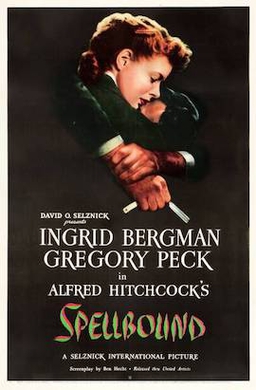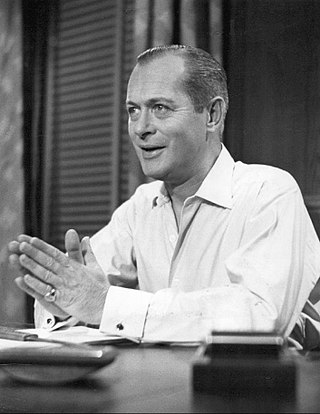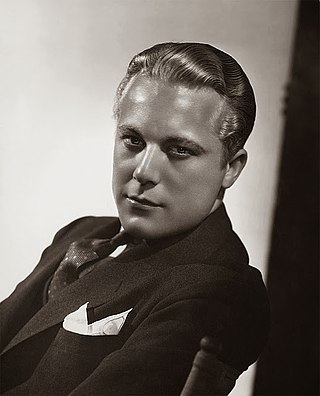
Sir Alfred Joseph Hitchcock was an English film director. He is widely regarded as one of the most influential figures in the history of cinema. In a career spanning six decades, he directed over 50 feature films, many of which are still widely watched and studied today. Known as the "Master of Suspense", he became as well known as any of his actors thanks to his many interviews, his cameo roles in most of his films, and his hosting and producing the television anthology Alfred Hitchcock Presents (1955–65). His films garnered 46 Academy Award nominations, including six wins, although he never won the award for Best Director, despite five nominations.

Carole Lombard was an American actress. In 1999, the American Film Institute ranked Lombard 23rd on its list of the greatest female stars of Classic Hollywood Cinema.

Rear Window is a 1954 American mystery thriller film directed by Alfred Hitchcock and written by John Michael Hayes based on Cornell Woolrich's 1942 short story "It Had to Be Murder". Originally released by Paramount Pictures, the film stars James Stewart, Grace Kelly, Wendell Corey, Thelma Ritter, and Raymond Burr. It was screened at the 1954 Venice Film Festival.

Suspicion is a 1941 romantic psychological thriller film noir directed by Alfred Hitchcock, and starring Cary Grant and Joan Fontaine as a married couple. It also features Sir Cedric Hardwicke, Nigel Bruce, Dame May Whitty, Isabel Jeans, Heather Angel, and Leo G. Carroll. Suspicion is based on Francis Iles's novel Before the Fact (1932).

Spellbound is a 1945 American psychological thriller directed by Alfred Hitchcock, and starring Ingrid Bergman, Gregory Peck, and Michael Chekhov. It follows a psychoanalyst who falls in love with the new head of the Vermont hospital in which she works, only to find that he is an imposter suffering dissociative amnesia, and potentially, a murderer. The film is based on the 1927 novel The House of Dr. Edwardes by Hilary Saint George Saunders and John Palmer.

Muriel Teresa Wright was an American actress. She was nominated twice for the Academy Award for Best Supporting Actress: in 1941 for her debut work in The Little Foxes, and in 1942 for Mrs. Miniver, winning for the latter. That same year, she received a nomination for the Academy Award for Best Actress for her performance in The Pride of the Yankees, opposite Gary Cooper. She is also known for her performances in Alfred Hitchcock's Shadow of a Doubt (1943) and William Wyler's The Best Years of Our Lives (1946).

Alma Lucy Reville, Lady Hitchcock was an English screenwriter and film editor. She was the wife of film director Alfred Hitchcock. She collaborated on scripts for her husband's films, including Shadow of a Doubt, Suspicion, and The Lady Vanishes, as well as scripts for other directors, including Henrik Galeen, Maurice Elvey, and Berthold Viertel.

Notorious is a 1946 American spy film noir directed and produced by Alfred Hitchcock, starring Cary Grant, Ingrid Bergman, and Claude Rains as three people whose lives become intimately entangled during an espionage operation.

The Paradine Case is a 1947 courtroom drama with elements of film noir set in England, directed by Alfred Hitchcock and produced by David O. Selznick. Selznick and an uncredited Ben Hecht wrote the screenplay from an adaptation by Alma Reville and James Bridie of the 1933 novel by Robert Smythe Hichens. The film stars Gregory Peck, Ann Todd, Alida Valli, Charles Laughton, Charles Coburn, Ethel Barrymore, and Louis Jourdan. It tells of an English barrister who falls in love with a woman who is accused of murder, and how it affects his relationship with his wife.

The Lodger: A Story of the London Fog is a 1927 British silent thriller film directed by Alfred Hitchcock and starring Marie Ault, Arthur Chesney, June Tripp, Malcolm Keen and Ivor Novello. Hitchcock's third feature film, it was released on 14 February 1927 in London and on 10 June 1928 in New York City. The film is based on the 1913 novel The Lodger by Marie Belloc Lowndes and the play Who Is He? co-written by Belloc Lowndes. Its plot concerns the hunt for a Jack the Ripper-like serial killer in London.

Robert Montgomery (; born Henry Montgomery Jr.; was an American actor, director, and producer. He began his acting career on the stage, but was soon hired by MGM. Initially assigned roles in comedies, he soon proved he was able to handle dramatic ones, as well. He appeared in a wide variety of roles, such as the weak-willed prisoner Kent in The Big House, the psychotic Danny in Night Must Fall, and Joe, the boxer mistakenly sent to Heaven in Here Comes Mr. Jordan. The last two earned him nominations for the Academy Award for Best Actor.

Rebecca is a 1940 American romantic psychological thriller film directed by Alfred Hitchcock. It was Hitchcock's first American project, and his first film under contract with producer David O. Selznick. The screenplay by Robert E. Sherwood and Joan Harrison, and adaptation by Philip MacDonald and Michael Hogan, were based on the 1938 novel of the same name by Daphne du Maurier.

John Elmer Carson, known as Jack Carson, was a Canadian-born American film actor. Carson often played the role of comedic friend in films of the 1940s and 1950s, including The Strawberry Blonde (1941) with James Cagney and Arsenic and Old Lace (1944) with Cary Grant. He appeared in such dramas as Mildred Pierce (1945), A Star is Born (1954), and Cat on a Hot Tin Roof (1958). He worked for RKO and MGM, but most of his notable work was for Warner Bros.

Gene Raymond was an American film, television, and stage actor of the 1930s and 1940s. In addition to acting, Raymond was also a singer, composer, screenwriter, director, producer, and decorated military pilot.

The 39 Steps is a 1935 British spy thriller film directed by Alfred Hitchcock, starring Robert Donat and Madeleine Carroll. It is loosely based on the 1915 novel The Thirty-Nine Steps by John Buchan. It concerns a Canadian civilian in London, Richard Hannay, who becomes caught up in preventing an organisation of spies called "The 39 Steps" from stealing British military secrets. Mistakenly accused of the murder of a counter-espionage agent, Hannay goes on the run to Scotland and becomes tangled up with an attractive woman, Pamela, while hoping to stop the spy ring and clear his name.
Norman Krasna was an American screenwriter, playwright, producer, and film director who penned screwball comedies centered on a case of mistaken identity. Krasna directed three films during a forty-year career in Hollywood. He garnered four Academy Award screenwriting nominations, winning once for 1943's Princess O'Rourke, which he also directed.

Before the Fact (1932) is an English novel by Anthony Berkeley Cox writing under the pen name "Francis Iles". It tells the story of a woman marrying a man who is after her inherited money and prepared, it seems, to kill her for it. Whether he does succeed in the end, or whether she has been imagining his plots, is left unclear. Together with the previous Iles book Malice Aforethought (1931), it can be placed in the category of psychological suspense novel. Elements of the story were used for the 1941 American film Suspicion, directed by Alfred Hitchcock.

You and Me is a 1938 American crime drama/comedy/romance film directed by Fritz Lang. It stars Sylvia Sidney and George Raft as a pair of ex-convicts on parole, working in a department store whose owner, played by Harry Carey, routinely hires former criminals to give them a second chance. It was written by Norman Krasna and Virginia Van Upp.

Fools for Scandal is a 1938 screwball comedy film starring Carole Lombard and Fernand Gravet, featuring Ralph Bellamy, Allen Jenkins, Isabel Jeans, Marie Wilson and Marcia Ralston, and produced and directed by Mervyn LeRoy. It was written by Herbert Fields and Joseph Fields with additional dialogue by Irving Brecher, and uncredited contributions by others based on the unproduced 1936 play Return Engagement by Nancy Hamilton, James Shute and Rosemary Casey. The songs are by Richard Rodgers and Lorenz Hart.
The Man With Blond Hair is a play by Norman Krasna based on a true story. Although Krasna became better known for comedy this was a drama; the writer later said that he "really wrote" the play "to win the Nobel Peace Prize". The play only ran for 7 performances on Broadway. This failure prompted him to return to comedy and Krasna wrote Dear Ruth his most popular hit.



















